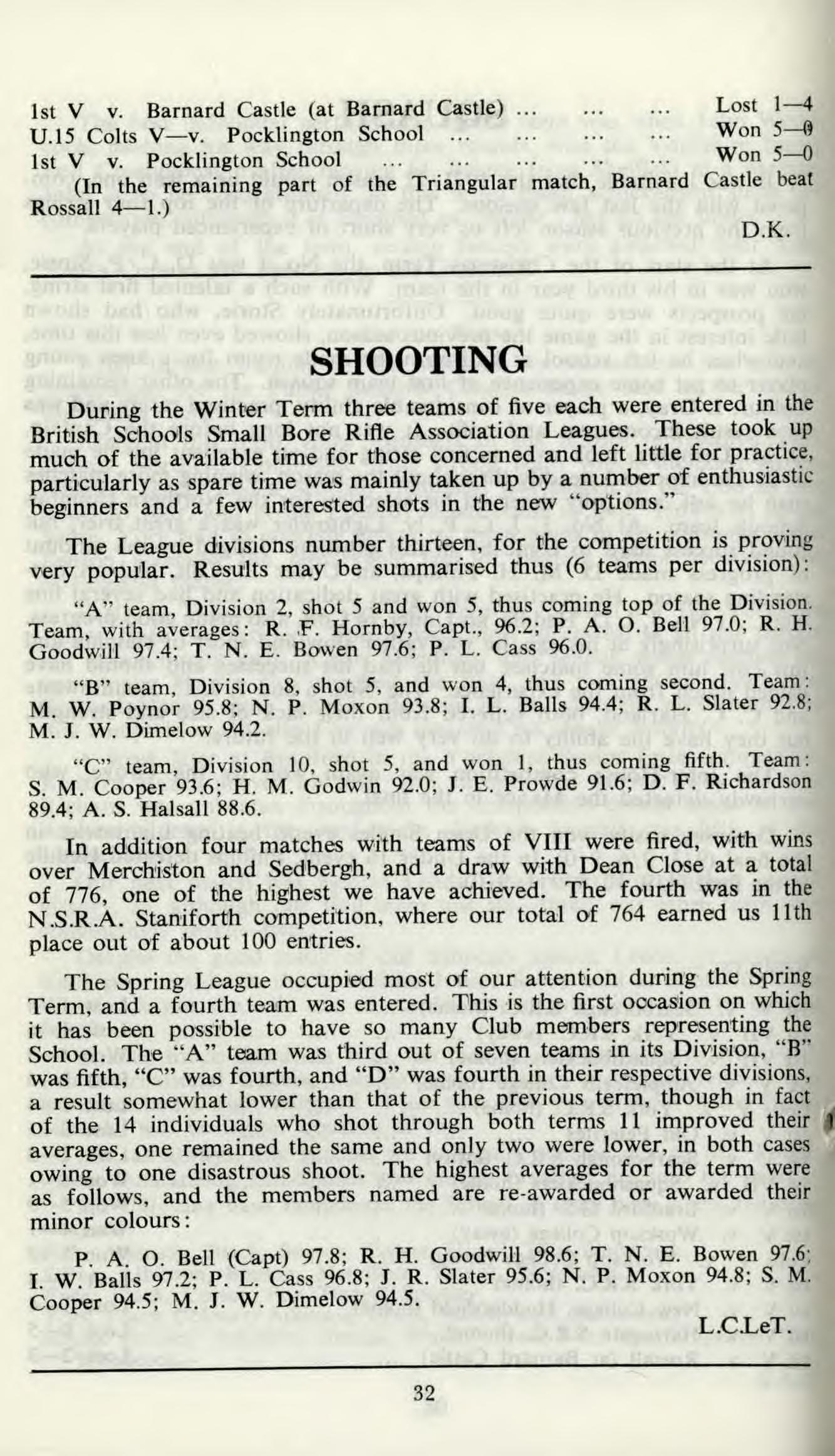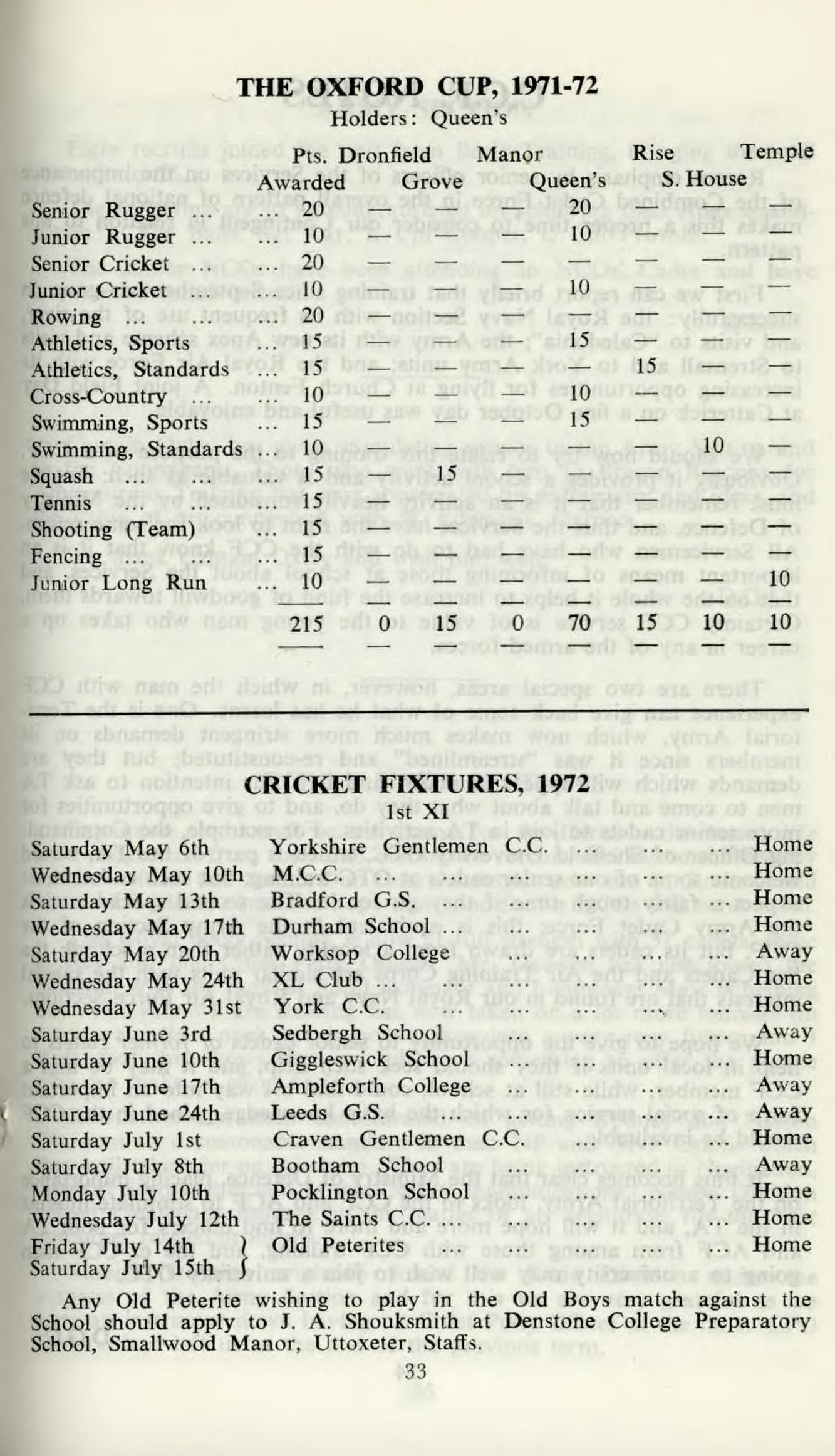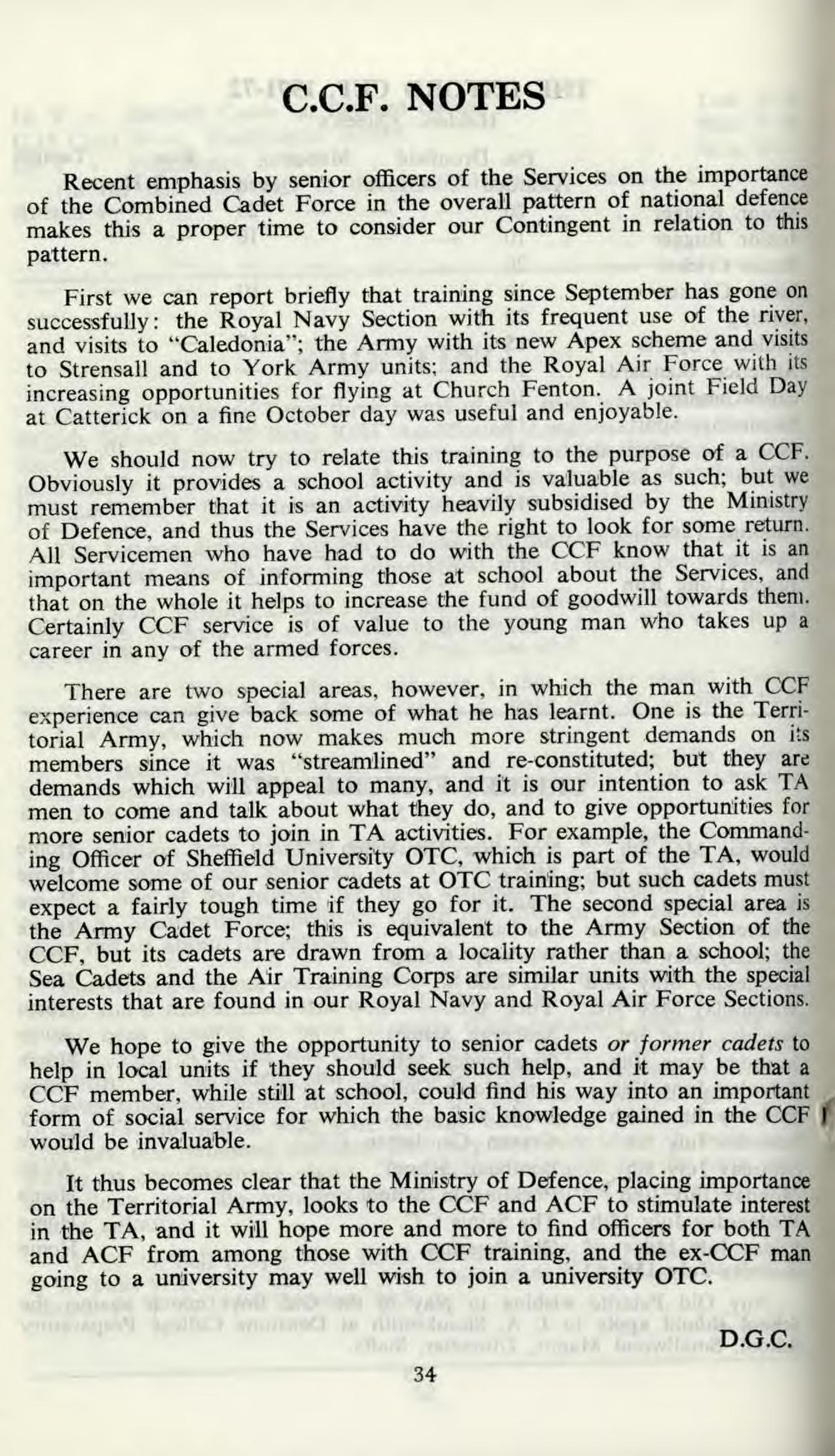
6 minute read
Shooting
from May 1972
by StPetersYork
1st V v. Barnard Castle (at Barnard Castle) ... Lost 1-4 U.15 Colts V—v. Pocklington School ... Won 5-0 1st V v. Pocklington School ... ... ... ... ... Won 5-0 (In the remaining part of the Triangular match, Barnard Castle beat Rossall 4-1.)
D.K.
During the Winter Term three teams of five each were entered in the British Schools Small Bore Rifle Association Leagues. These took up much of the available time for those concerned and left little for practice, particularly as spare time was mainly taken up by a number of enthusiastic beginners and a few interested shots in the new "options."
The League divisions number thirteen, for the competition is proving very popular. Results may be summarised thus (6 teams per division): "A" team, Division 2, shot 5 and won 5, thus coming top of the Division. Team, with averages: R. F. Hornby, Capt., 96.2; P. A. O. Bell 97.0; R. H. Goodwill 97.4; T. N. E. Bowen 97.6; P. L. Cass 96.0. "B" team, Division 8, shot 5, and won 4, thus coming second. Team: M. W. Poynor 95.8; N. P. Moxon 93.8; I. L. Balls 94.4; R. L. Slater 92.8; M. J. W. Dimelow 94.2. "C" team, Division 10, shot 5, and won 1, thus coming fifth. Team: S. M. Cooper 93.6; H. M. Godwin 92.0; J. E. Prowde 91.6; D. F. Richardson 89.4; A. S. Halsall 88.6.
In addition four matches with teams of VIII were fired, with wins over Merchiston and Sedbergh, and a draw with Dean Close at a total of 776, one of the highest we have achieved. The fourth was in the N.S.RA. Staniforth competition, where our total of 764 earned us 11th place out of about 100 entries.
The Spring League occupied most of our attention during the Spring Term, and a fourth team was entered. This is the first occasion on which it has been possible to have so many Club members representing the School. The "A" team was third out of seven teams in its Division, "B" was fifth, "C" was fourth, and "D" was fourth in their respective divisions, a result somewhat lower than that of the previous term, though in fact of the 14 individuals who shot through both terms 11 improved their averages, one remained the same and only two were lower, in both cases owing to one disastrous shoot. The highest averages for the term were as follows, and the members named are re-awarded or awarded their minor colours:
P. A. O. Bell (Capt) 97.8; R. H. Goodwill 98.6; T. N. E. Bowen 97.6; I. W. Balls 97.2; P. L. Cass 96.8; J. R. Slater 95.6; N. P. Moxon 94.8; S. M. Cooper 94.5; M. J. W. Dimelow 94.5. 32 L.C.LeT. 1
THE OXFORD CUP, 1971-72 Holders: Queen's
Senior Rugger Junior Rugger Senior Cricket Junior Cricket Rowing ... Athletics, Sports Athletics, Standards Cross-Country ... Swimming, Sports Swimming, Standards Squash ... Tennis ... Shooting (Team) Fencing ... Junior Long Run
Pts. Dronfield Awarded 20 10 • • • 20 10 • • • 20 15 • • • 15 Manor
Grove Queen's — — 20 10 10 15
• • • 10
• • • 15 10 15
10 15 15 15 15 15
• • • 10
215 0 15 0 70 Rise Temple
S. House — — —
15
10
15 10 10
CRICKET FIXTURES, 1972
1st XI Saturday May 6th Yorkshire Gentlemen C.C. Wednesday May 10th Saturday May 13th Wednesday May 17th Saturday May 20th Wednesday May 24th Wednesday May 31st Saturday June 3rd Saturday June 10th Saturday June 17th Saturday June 24th Saturday July 1st Saturday July 8th Monday July 10th Wednesday July 12th Friday July 14th 1 Saturday July 15th Bradford G.S. . Durham School ... Worksop College XL Club ... York C.C. ... Sedbergh School Giggleswick School Ampleforth College Leeds G.S. Craven Gentlemen C.C. Bootham School Pocklington School The Saints C.C. ... Old Peterites
Home Home Home Home Away Home Home ••• Away ••• Home ••• Away ••• Away ••• Home ••• Away ••• Home ••• Home ••• Home

Any Old Peterite wishing to play in the Old Boys match against the School should apply to J. A. Shouksmith at Denstone College Preparatory School, Smallwood Manor, Uttoxeter, Staffs. 33
Recent emphasis by senior officers of the Services on the importance of the Combined Cadet Force in the overall pattern of national defence makes this a proper time to consider our Contingent in relation to this pattern.
First we can report briefly that training since September has gone on successfully: the Royal Navy Section with its frequent use of the river, and visits to "Caledonia"; the Army with its new Apex scheme and visits to Strensall and to York Army units; and the Royal Air Force with its increasing opportunities for flying at Church Fenton. A joint Field Day at Catterick on a fine October day was useful and enjoyable.
We should now try to relate this training to the purpose of a CCF. Obviously it provides a school activity and is valuable as such; but we must remember that it is an activity heavily subsidised by the Ministry of Defence, and thus the Services have the right to look for some return. All Servicemen who have had to do with the CCF know that it is an important means of informing those at school about the Services, and that on the whole it helps to increase the fund of goodwill towards them. Certainly CCF service is of value to the young man who takes up a career in any of the armed forces.
There are two special areas, however, in which the man with CCF experience can give back some of what he has learnt. One is the Territorial Army, which now makes much more stringent demands on its members since it was "streamlined" and re-constituted; but they are demands which will appeal to many, and it is our intention to ask TA men to come and talk about what they do, and to give opportunities for more senior cadets to join in TA activities. For example, the Commanding Officer of Sheffield University OTC, which is part of the TA, would welcome some of our senior cadets at OTC training; but such cadets must expect a fairly tough time if they go for it. The second special area is the Army Cadet Force; this is equivalent to the Army Section of the CCF, but its cadets are drawn from a locality rather than a school; the Sea Cadets and the Air Training Corps are similar units with the special interests that are found in our Royal Navy and Royal Air Force Sections.
We hope to give the opportunity to senior cadets or former cadets to help in local units if they should seek such help, and it may be that a CCF member, while still at school, could find his way into an important form of social service for which the basic knowledge gained in the CCF would be invaluable.
It thus becomes clear that the Ministry of Defence, placing importance on the Territorial Army, looks to the CCF and ACF to stimulate interest in the TA, and it will hope more and more to find officers for both TA and ACF from among those with CCF training, and the ex-CCF man going to a university may well wish to join a university OTC.

D.G.C.










